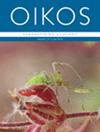守护神的魅力:比较恩惠植物和气候调解对多样性的影响
IF 3
2区 环境科学与生态学
Q2 ECOLOGY
引用次数: 0
摘要
沙漠承受着巨大的人为压力。缓冲当地环境和生物多样性变化的能力对于生态系统的功能至关重要。基础物种是快速评估生态功能的一种解决方案,也是防止生物多样性持续丧失的一种简单的自然解决方案。基础物种被定义为对生物网络发挥和促进一系列积极作用的物种。加利福尼亚中部干旱地区的两种不同灌木物种被用来评估植物物种丰富性的潜在缓冲区,并研究基础促进物种的特异性。我们在两个不同的干旱地区使用了一个为期五年的数据集,以检验基础植物的直接影响是否会促进其他植物物种的生长,并缓冲因气候变化而造成的多样性损失。根据预测,两种灌木物种对物种丰富度的积极影响会随着当地取样温度的升高而增加。最后,在训练有素的贝叶斯模型中对该地区温度上升的预测表明,这两种灌木物种促进植物物种丰富度的能力都会显著提高。通俗地说,这种积极的生态效应可以被描述为 "保护神 "假说,因为无论保护神的形式如何,灌木物种都是防止当地物种丰富度因温度升高而减少的护身符。本文章由计算机程序翻译,如有差异,请以英文原文为准。
Patronus charm: a comparison of benefactor plants and climate mediation effects on diversity
Deserts are subject to significant anthropogenic pressure. The capacity to buffer against changes in the local environment and biodiversity are critical for ecosystem functioning. Foundation species can be a solution to rapidly assess ecological function and provide a simple nature-based solution to protect against continuing biodiversity losses. A foundation species is defined as a species that exerts and promotes a positive set of processes for the biotic network. Two different shrub species in the central drylands of California were used to assay a potential buffer for plant species richness and to examine the species-specificity of foundation facilitation. A five-year dataset in two distinct regions differing in aridity was used to test the hypothesis that the direct effects of foundation plants facilitate other plant species and buffer diversity losses to a changing climate. The predicted positive effects of both shrub species on species richness increased with increasing local temperatures sampled. Finally, projected temperature increases for the region in trained Bayesian models demonstrated that both shrub species can profoundly increase in their capacity to facilitate plant species richness. Colloquially, this positive ecological effect can be described as the patronus charm hypothesis because regardless of the form of the protector, shrub species provided a talisman against local loss of richness driven by temperature increases.
求助全文
通过发布文献求助,成功后即可免费获取论文全文。
去求助
来源期刊

Oikos
环境科学-生态学
CiteScore
6.20
自引率
5.90%
发文量
152
审稿时长
6-12 weeks
期刊介绍:
Oikos publishes original and innovative research on all aspects of ecology, defined as organism-environment interactions at various spatiotemporal scales, so including macroecology and evolutionary ecology. Emphasis is on theoretical and empirical work aimed at generalization and synthesis across taxa, systems and ecological disciplines. Papers can contribute to new developments in ecology by reporting novel theory or critical empirical results, and "synthesis" can include developing new theory, tests of general hypotheses, or bringing together established or emerging areas of ecology. Confirming or extending the established literature, by for example showing results that are novel for a new taxon, or purely applied research, is given low priority.
 求助内容:
求助内容: 应助结果提醒方式:
应助结果提醒方式:


